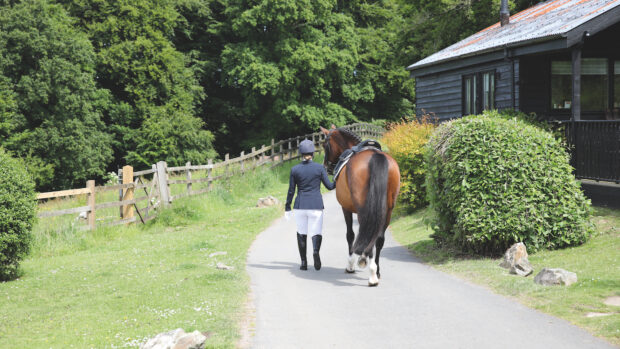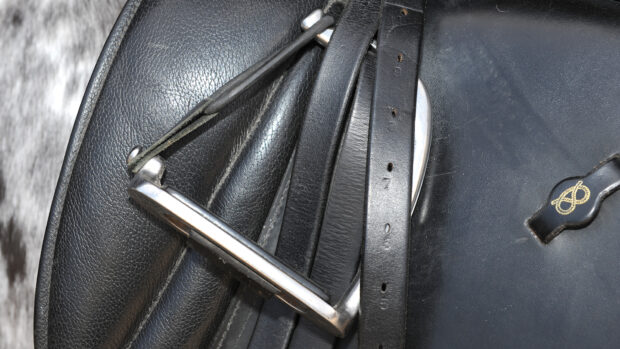A US eventing rule change increasing minimum eligibility requirements has been put on hold until 2023 while further investigations take place.
The proposal, developed by the United States Eventing Association’s cross-country safety subcommittee following analysis of US eventing accidents, was first outlined at USEA’s annual meeting and convention in 2019. It called for an increase to minimum eligibility requirements (MERs) and rider categorisation, in US Equestrian’s (USEF) rules of eventing.
At the time Jonathan Holling, chair of the USEA cross-country safety committee, said he wanted riders to have more of a base knowledge and ability than the standard MERs asked for.
“We looked at records of very successful upper-level riders – Olympic calibre riders – and we found that in most cases (virtually all of them) did two to three times more than our minimum requirements to be able to move a horse up,” Mr Holling said.
“When we looked at that, we said, ‘maybe we don’t have right what we are requiring for the base of the sport.’ We felt pretty strongly, and the data confirmed, that one way we can increase the skill of riders and the horsemanship and relationship between the horses and the riders is to raise the minimum eligibility requirements. In a nutshell, people will have to do more at a level before they can move up.”
Under current rules, each national level has a different set of requirements, for example a horse can compete at intermediate level when it has four MERs at preliminary level horse trials, and one of these results can include 20 cross-country jumping penalties. A MER at national level is a completion with no more than 50 penalties in dressage, no jumping penalties and no more than 36 time-penalties across country, and no more than 16 jumping penalties.
The proposed rule change called for riders to hold licences in recognition of proven competence at a certain level. To hold an A licence, riders must have obtained 25 MERs at intermediate level and above, B riders must have obtained 25 MERs at preliminary and above, and riders who do not have these MERs would be categorised as “unlicensed”.
In line with the licences, this would mean to compete at preliminary level, A riders must have obtained an MER at four training level horse trials within 24 months, B riders must have obtained seven MERs within 24 months, and unlicensed riders must have obtained 10 MERs within 24 months. B and unlicensed riders must have obtained these with a horse as a combination.
In February 2021 following feedback from USEA members, the USEA board of governors voted to modify the proposal to lower the requirements, but still recommend the establishment of rider licences and increase of MERs. The revised proposal included a requirement that at preliminary level and above at least one MER must have been obtained within eight weeks prior to the competition.
The revised proposal also called for licence requirements for preliminary level to be changed to; four MERs for A riders at training level or above, B riders must have obtained four MERs plus two additional MERs with no more than 20 jumping cross-country penalties, and unlicensed riders must have six MERs, plus two additional with no more than 20 jumping cross-country penalties.
On 1 March the USEA’s board of governors submitted the proposal to USEF. The board “made it clear” they shared the position of the USEA cross-country safety subcommittee that more needs to be done to ensure riders and horses obtain more than just a minimal amount of experiences.
The USEF board gathered feedback from the public on the changes and received more than 1,200 responses and it had been recognised that due to not the USEA annual meeting and convention and other meetings not running in person last year, a portion of the membership did not feel “fully informed” about the proposal. Subsequently the board determined work needed to be done to investigate the questions raised and communicatie the reasoning behind the rule change.
“The USEA cross-country safety subcommittee has done an amazing job to champion a major change in how horses and riders are allowed to move through the ranks of our sport,” said Jonathan Elliott, USEA vice-president of competitions.
“The consensus from the feedback I have received and observed is that there is a need for this change, but there are many factors to consider. In the end, this is a safety-driven rule change proposal, and we need to make sure we get it right, not perfect because that will never happen, but right.”
Mr Elliott added he believed more time was needed to continue and develop a complete proposal “with justification” for the proposed changes.
“Big strides have been accomplished over the last few years with other safety-related rule changes and the frangible technology fundraising and I am optimistic an updated [proposal] will join that evolution of our sport in 2023.”
Continued below…

Proposed US eventing rule change would bring sport more in line with Britain
“We checked with EquiRatings to see if there is any statistical evidence that knocking down rails in showjumping is indicative

‘True champion of eventing’: US course-designer dies in accident
In 2006 he was awarded the Neil Ayer Course Designers’ Award for his service to the sport as a cross-country

Subscribe to Horse & Hound magazine today – and enjoy unlimited website access all year round
The board unanimously voted to postpone the rule change with the intention to further investigate and communicate the purpose behind the proposal.
“The board has made it clear that they will submit an amended proposal again with the intent for implementation in 2023. To this end, the USEA will establish a task force to further review the proposal, make additional inquiries into related data, and analyze the input received,” said a USEA spokesman.
“This task force will consist of representation by individuals from diverse backgrounds and geographically varied locations around the country. The goal is to have an updated rule in effect for the 2023 competition year.”
Horse & Hound magazine, out every Thursday, is packed with all the latest news and reports, as well as interviews, specials, nostalgia, vet and training advice. Find how you can enjoy the magazine delivered to your door every week, plus options to upgrade to access our H&H Plus online service which brings you breaking news as it happens as well as other benefits.




